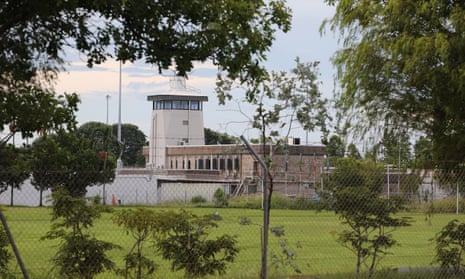The Don Dale juvenile detention centre was spiralling out of control in the years leading up to the 2014 teargassing incident, a former youth justice officer has told the royal commission.
Leonard de Souza told the inquiry into the protection and detention of children in the Northern Territory he witnessed increasing levels of violence and racism but that his reports and warnings fell on deaf ears.
Giving evidence on Wednesday, he described a system descending into “chaos” with guards “doing their own thing”, as policies and procedures weren’t updated or provided and an increasingly casualised workforce was not sufficiently trained.
Among the allegations raised during his testimony, De Souza said “quite a few officers” used inappropriate language against detainees, with one officer broadcasting “you black cunt” through the PA system.
“It was disgraceful,” he said. “Under the code of conduct, it was everything against what a youth justice officer should be.”
De Souza said he reported it to management but “it fell on deaf ears”.
He also received a report of a male worker touching a female detainee in a sexually inappropriate way and he reported it to superiors.
De Souza also accused the former deputy general manager James Sizeland – who is expected to give evidence to the commission at a later date – of giving unauthorised training to a group of officers.
“I walked in a cell just to talk to him and I found him doing some cell extractions with a group of staff he’d handpicked,” De Souza said. “This is not my phrasing – this was from other staff – but they were called the Don Dale turtles. I think it was a catchphrase from the Ninja Turtles movie.
“I said it’s not authorised training, you haven’t gone through me … He was flippant with everything I said to him.”
De Souza said by 2012 there was a lack of professionalism at the facility and a number of staff were continually “play fighting” with detainees, including some of the “Don Dale turtles”.
“How can you provide a positive role model when you’re teaching them to punch and kick?” he said.
De Souza was employed as a youth justice officer for Don Dale in 2007 with just three days of incident response training and said he was shocked at the lack of standard operating procedures or basic workplace health and safety.
He said it was understood he would learn other skills on the job – including suicide prevention, cultural awareness and mental health training.
When he later gained some qualifications as an instructor he was asked to train youth justice officers but refused because he was uncomfortable with signing people off as “fully fledged officers” after just three days.
He was told his refusal was “not a good career move”.
In later years, when the spithood was introduced, few officers received training, he said.
He said he met with a training manager every week to update them on the weekend’s assaults on staff and warned there would be a riot if training was not improved.
He said that, in the first few years of his employment, between 2007 to 2009, the centre was much calmer, mainly because of the many programs for detainees, which he estimated about a quarter of all guards volunteered to assist with.
He also noted that the back cells were used more sparingly with children isolated for eight to 12 hours at most.
“I’ve been with Don Dale a long time and, compared to recent times, they were absolutely settled ... we had a lot better management at the time as well.”
De Souza said the centre also had better management, in operations manager Tony O’Leary, who wanted to see the detention centre progress.
However, a lot of the programs fell away when Michael Yaxley took over as acting operations manager in 2009 or 2010, De Souza said. Yaxley is also expected to give evidence to the hearing at a later date.
De Souza said there was a downward spiral in the morale among staff who felt they could offer more to the detainees.
As the detainee population increased the back cells were routinely used to deal with overflow and staff struggled to deal with young boys and the increasing proportion of girls.
He said he had recommended a three detainee to one officer ratio but that it was sometimes 30 to one or two officers.
Following a riot on Boxing Day in 2011 a memo was circulated that changed the name of the back cells to the “behavioural management unit”, which De Souza believed was an attempt to get around legislation that set a maximum detention period of 72 hours in the solitary cells.
Staff also were reluctant to intervene in incidents between detainees, which De Souza ascribe to a lack of training and the fact that their duress alarms routinely didn’t work.
The commission continues.
